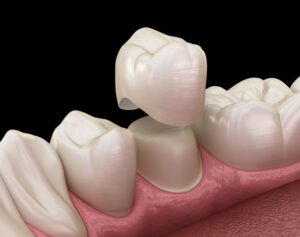
Dental crowns are one of the most effective and long-lasting solutions for restoring damaged or weakened teeth. Whether you’ve had one placed to repair a large cavity, protect a cracked tooth, or cover a dental implant, it’s natural to wonder how long your investment will last. The good news is that dental crowns are designed for durability. With the right care, they can serve you well for many years.
Average Lifespan of a Dental Crown
On average, a dental crown lasts between 10 to 15 years. However, some crowns can last 20 years or longer, especially when patients maintain excellent oral hygiene and avoid habits that can wear them down. The lifespan of a crown depends on several factors, including the material used, your oral habits, and how well you care for it.
Different Crown Materials and Their Durability
There are various types of dental crowns, and the material you choose plays a significant role in longevity:
- Porcelain or ceramic crowns: These are popular for their natural look, especially for front teeth. They typically last around 10 to 15 years.
- Porcelain-fused-to-metal (PFM): These combine aesthetics and strength. PFM crowns can last 10 to 15 years or more but may eventually show a dark line at the gumline as the metal becomes visible.
- Gold or metal alloy crowns: Known for exceptional durability, metal crowns can last 20 years or more. While not as natural-looking, they’re ideal for molars that endure heavy chewing forces.
- Zirconia crowns: A newer material known for its strength and appearance, zirconia crowns can last well over 15 years with proper care.
Factors That Affect Crown Longevity
The way you care for your crown is just as important as the material used. Here are a few key factors that can impact how long your crown will last:
- Oral hygiene: Brushing twice a day, flossing daily, and regular dental checkups are essential. While the crown itself can’t decay, the tooth underneath still can.
- Diet and habits: Chewing ice, biting nails, or using your teeth as tools can damage your crown. Sticky and hard foods can also loosen or crack the crown over time.
- Teeth grinding (bruxism): Grinding your teeth can put significant pressure on crowns. If you suffer from bruxism, a nightguard can help protect your dental work.
- Gum health: Gum disease can cause the supporting structure of the crown to weaken, leading to premature failure.
When to Replace a Crown
A dental crown may need to be replaced if it becomes loose, cracks, causes discomfort, or if decay develops beneath it. Regular dental checkups allow your dentist to monitor the condition of your crown and address any issues early.
Dental crowns are a long-lasting solution for restoring and protecting your teeth, with an average lifespan of 10 to 15 years and potentially much longer with proper care. By choosing the right material, maintaining good oral hygiene, and avoiding damaging habits, you can extend the life of your crown and keep your smile healthy for years to come.
About the Author
Dr. Bryan Friedland has more than a decade of practicing dentistry under his belt, most years spent here in Pembroke Pines. He earned his dental degree from Nova Southeastern University and afterwards completed a General Practice Residency at Long Island Jewish Hospital in New York. Dr. Friedland is also committed to ongoing education, logging countless hours in dental implantology and spending time becoming Invisalign certified. Trust our dentist’s years of experience and the rest of our talented team to provide you with a durable dental crown if you’re in need of a restoration. Call (954) 450-6640 or visit our website to make an appointment.

